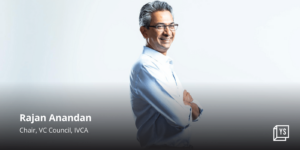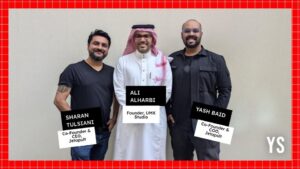An initiative by the South Korean Ministry of SMEs and Startups and the National IT Industry Promotion Agency (NIPA), the K-Startup Grand Challenge 2022 is the world’s largest annually-held global startup accelerator program to encourage promising startups to venture into the Korean and, eventually, the Asian market. Launched in 2016, the program leverages South Korea’s ideal location and position at the forefront of rapid tech growth and innovation to engage and support startups in their journey of expansion.
Just like the past year, this year witnessed massive participation from startups working in artificial intelligence, fintech, gaming, IoT, urban solutions, and more. There were a total of over 2,600 applications from 122 countries, of which 60 startups from across the globe have been selected to participate in the accelerator program in Seoul, South Korea.
At the Demo Day, held between June 22 to June 24, 84 startups from the South Asian region pitched their ideas to expand their businesses in front of a joint Indian and Korean jury.
Startups shortlisted after the Demo Day
Nine startups from the South Asian region have been selected to proceed to the next round: the accelerator program. Scheduled to take place for three-and-a-half months from August 1 in the Global Startup Campus at the Pangyo Techno Valley, Gyeonggi-do, Seoul, the accelerator program is designed to enable selected startups to develop their ideas and expand business in South Korea.
Here’s a glimpse of what these startups do:
1. LivNSense Technologies Pvt Ltd (India): This B2B startup is a green industrial-AI platform venture established in 2018 with a vision to build a safer and sustainable world. LivNSense’s flagship digital twins platform GreenOps™ addresses the energy balance by harnessing the power of AI and digital twins technology to impact decarbonisation across the process value chain with 100+ patented IPs in Process AI.
2. StandWeSpeak (India): A one-stop sexual and reproductive health platform. StandWeSpeak was started in 2021 as a SexTech venture to build a “21st-century sexual health ecosystem for youth.” They leverage AI technology to enhance young people’s access to sexual and reproductive healthcare information and services across the globe.
3. Beagle Cyber Innovations Pvt. Ltd. (India): Beagle Cyber Innovations Pvt. Ltd is a B2B startup that focuses on empowering businesses to proactively tackle cyber threats and make the internet a safer place. Their product Beagle Security acts as an automated web application penetration testing tool that helps businesses identify vulnerabilities on their website & APIs before hackers can exploit them and provide actionable insights to address the threats.
4. Quickwork Technologies Private Limited (India): Established in 2015, Quickwork Technologies Private Limited is a real-time Integration and API platform with a vision to democratise automation by making it easy, accessible, affordable, and compliant. The startup allows SaaS companies, banks, and other institutions to build simple and complex workflows, create and publish secure APIs, and manage conversational interactions with customers, employees and partners to provide a great user experience.
5. Defect Scanner (India): Defect Scanner is an Indian B2B IoT startup that focuses on a simple and low-cost method of deploying plug & play AI vision to quality-check manufactured goods and detect defective products. Established in May 2022, they have already deployed our solution for Hyundai, KIA and BMW Moto manufactured parts in India.
6. UbiLang (India): Established in 2020, UbiLang is a media-focused B2B startup that aims to make it easy for content creators & media industry to go multilingual. The tools in the application allow users to quickly translate or dub audio-visual content with a few clicks. Their services include subtitle generation, transcription and translation as well.
7. MobiQu (Turkey): An IoT-based B2B startup started in 2021, MobiQu is a next-generation last-mile delivery box company. They design temperature-controlled and IoT-enabled packaging solutions with sensors that preserve, track, and monitor your deliveries to ensure efficient, cost-effective, and safe cold chain and last-mile delivery.
8. OPLOG (Turkey): OPLOG is a tech-enabled fulfilment company that is focused on democratising E-commerce and catalysing the growth of consumer brands by focusing on improving the operational excellence and post-purchase experience of consumers. The key industries that the 300-member-strong OPLOG team handles orders in are consumer electronics, FMCG, fashion, cosmetics, stationery, and kitchenware.
9. Spectalix (Israel): Started in 2017, Spectalix offers consumer app owners a revolutionary UGC-platform. Using AI, they allow content publishers to reclaim their users on their consumer app by having their own social video platform on their app.
What will the accelerator program include?
Each of the selected startup teams will receive USD 2,663 per month (KRW 3,500,000) to cover living expenses over 3.5 months starting from August. They will work out of a centrally-located free office space with access to a Global R&D Centre, Public Support Centre, and an Industry-Academy R&D Centre, among other facilities.
The teams will attend coaching sessions on Korean and Asian business culture and be able to avail consultation on topics like patents, accounting regulations, tax laws, and more.
Korean interns will be assigned to teams (1 person per 2 teams) to ease language and cultural barriers. The startups can also avail of one-on-one mentoring from experts, besides regular networking events to interact with Korean conglomerates and industry leaders to promote cooperation and forge potential partnerships.
Support after the program
At the end of the acceleration program, the government will host a Demo Day in November 2022 to felicitate the top 30 startups.
The winner will receive USD 120,000 (132,000,000 KRW), followed by USD 70,000 (77,000,000 KRW), USD 40,000 (44,000,000 KRW), and USD 25,000 (27.500,000 KRW) for the first, second, and third runners up respectively.
Following this, there will be a Settlement Program from January 15 to June 30, 2023, which will support the top 30 teams settling in South Korea. They will each be eligible to receive total funding of 12,250,000 KRW for settlement in Korea based on their performance.


![Read more about the article [Funding alert] Healthtech startup NeoDocs raises pre-seed round from Y Combinator, 9Unicorns and Titan Capital](https://blog.digitalsevaa.com/wp-content/uploads/2021/08/startup-finance-1598536283044-300x150.png)







